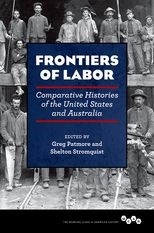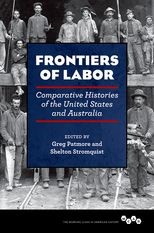Frontiers of Labor: Comparative Histories of the United States and Australia
Frontiers of Labor: Comparative Histories of the United States and Australia
Cite
Abstract
Australia and the United States have long been recognized as fertile fields for comparative history. Both the United States and the Australian colonies were “frontier societies” with considerable natural resources and without a feudal heritage. Despite their similarities, the histories of Australia and the United States are also marked by striking divergences, notably in the composition of their working classes, their labor relations, and their politics. The essays in this volume break new ground in comparative and transnational history. Together they offer considerable evidence to support the general proposition that despite similarities in the development of their economies and in fabric of their democratic institutions, the labor histories of Australia and the United States manifest notable differences. The essays in this volume make significant contributions to understanding the comparative aspects of Australian and US labor history in five areas specifically. They examine the divergent impact of the Great War on the fortunes of labor and socialist movements, the history of coerced labor, patterns of ethnic and class identification, the forms of working-class collective action and institution building, and struggles over trade union democracy and the viability of independent working-class politics. Additionally, several essays explore the ways in which radical labor and political activists from both countries developed transnational ties that cross-fertilized their respective trade union and political cultures.
-
Front Matter
-
US and Australian Labor: A Comparative and Transnational Perspective
-
Part 1 The Great War: Repression and Political Countermobilization
-
Quite Like Ourselves: Opposition to Military Compulsion during the Great War in the United States and Australia
Robin Archer
-
Workers against Warfare: The American and Australian Experiences before and during World War I
Burgmann Jeffrey andJeffrey A. Johnson
-
Domestic “Dogs of War” Unleashed: The Comparative Fates of Municipal Labor and Socialist Politics in the United States and Australia during the Great War
Shelton Stromquist
-
In Not a Few Respects, a Common History: Women, Wartime Lawmaking, and the Prosecution of Dissenters
Diane Kirkby
-
Quite Like Ourselves: Opposition to Military Compulsion during the Great War in the United States and Australia
-
Part 2 Varieties of Labor Coercion
-
Part 3 Ethnicity and Class Identity: The Irish Diaspora in Australia and the United States
-
Part 4 Working-Class Collective Action and Labor Regulation
-
Causes of Railroad Labor Conflict: The Case of Queensland, Australia, and the Northern US Plains, 1880–1900
Bradley Bowden andPeta Stevenson-Clarke
-
Comparative Mutinies: Case Studies of Working-Class Agency in the 2nd Maine Volunteer Infantry Regiment, 1863, and the Australian Imperial Force, 1918
Nathan Wise
-
Causes of Railroad Labor Conflict: The Case of Queensland, Australia, and the Northern US Plains, 1880–1900
-
Part 5 Economic Democracy and Working-Class Institutions
-
How to Build a Trade Union Oligarchy: Guidance from the United States and Australia, 1886–1970
Scott Stephenson
-
The Experience of Labor in the Age of Reform: Workers’ Subjectivity, Welfare Legislation, and Liberal Hegemony in 1930s Australia and the United States
Benjamin Huf
-
Controlling Consumption: A Comparative History of Rochdale Consumer Cooperatives in Australia and the United States
Greg Patmore andNikola Balnave
-
How to Build a Trade Union Oligarchy: Guidance from the United States and Australia, 1886–1970
-
Part 6 Transnational Working-Class Politics
-
Anarchy at the Antipodes: Australian Anarchists and Their American Connections, 1885–1914
Tom Goyens
-
An Agitator Abroad: P.H. Hickey, Industrial Unionism, and Socialism in the United States, New Zealand, and Australia, 1900–1930
Peter Clayworth
-
Harry Bridges’s Australia, Australia’s Harry Bridges
Robert Cherny
- Conclusion: Harvesting the Fruits of Transnational and Comparative History
-
Anarchy at the Antipodes: Australian Anarchists and Their American Connections, 1885–1914
-
End Matter
Sign in
Personal account
- Sign in with email/username & password
- Get email alerts
- Save searches
- Purchase content
- Activate your purchase/trial code
Institutional access
-
Sign in through your institution
- Sign in with a library card Sign in with username/password Recommend to your librarian
Institutional account management
Sign in as administratorPurchase
Our books are available by subscription or purchase to libraries and institutions.
Purchasing information| Month: | Total Views: |
|---|---|
| December 2022 | 8 |
| December 2022 | 5 |
| January 2023 | 4 |
| January 2023 | 1 |
| May 2023 | 3 |
| June 2023 | 1 |
| November 2023 | 2 |
| February 2024 | 1 |
| April 2024 | 3 |
| April 2024 | 2 |
| April 2024 | 8 |




Get help with access
Institutional access
Access to content on Oxford Academic is often provided through institutional subscriptions and purchases. If you are a member of an institution with an active account, you may be able to access content in one of the following ways:
IP based access
Typically, access is provided across an institutional network to a range of IP addresses. This authentication occurs automatically, and it is not possible to sign out of an IP authenticated account.
Sign in through your institution
Choose this option to get remote access when outside your institution. Shibboleth/Open Athens technology is used to provide single sign-on between your institution’s website and Oxford Academic.
If your institution is not listed or you cannot sign in to your institution’s website, please contact your librarian or administrator.
Sign in with a library card
Enter your library card number to sign in. If you cannot sign in, please contact your librarian.
Society Members
Society member access to a journal is achieved in one of the following ways:
Sign in through society site
Many societies offer single sign-on between the society website and Oxford Academic. If you see ‘Sign in through society site’ in the sign in pane within a journal:
If you do not have a society account or have forgotten your username or password, please contact your society.
Sign in using a personal account
Some societies use Oxford Academic personal accounts to provide access to their members. See below.
Personal account
A personal account can be used to get email alerts, save searches, purchase content, and activate subscriptions.
Some societies use Oxford Academic personal accounts to provide access to their members.
Viewing your signed in accounts
Click the account icon in the top right to:
Signed in but can't access content
Oxford Academic is home to a wide variety of products. The institutional subscription may not cover the content that you are trying to access. If you believe you should have access to that content, please contact your librarian.
Institutional account management
For librarians and administrators, your personal account also provides access to institutional account management. Here you will find options to view and activate subscriptions, manage institutional settings and access options, access usage statistics, and more.